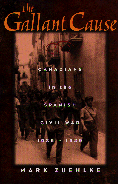


|
The Gallant Cause - Canadians in the Spanish Civil War, 1936 - 1939.
Mark Zuehlke. Subject Heading:
Grades 10 and up / Ages 15 and up. **** /4
|

excerpt:
More than two hundred Canadians were scattered throughout the various International Brigades. By June, their numbers were likely to exceed five hundred. Within the Lincolns, they organized an unofficial Canadian section called the Mackenzie-Papineaus, in honour of William Lyon Mackenzie and Louis-Joseph Papineau, leaders of the failed 1837 Rebellion against British rule in Upper and Lower Canada. The group immediately nicknamed itself Mac-Paps. Upon forming their own unit the Canadian ringleaders cabled Prime Minister King - grandson of William Lyon Mackenzie. The cable read: "We implore you from the depths of our hearts to do everything possible to help Spanish democracy. In so doing you are serving your own interests. We are here for the duration until fascism is defeated." King never replied.Author Mark Zuehlke describes his book as a work of "historical literary non-fiction." Using the participants' own words taken from letters, diaries, interviews, magazine articles and books, he presents an excellent account of this tragic period when about 1600 Canadians fought in Spain. Half of these men were killed on the battlefield.
1996 marked the 60th anniversary of the start of the Spanish Civil War, and at last the few living survivors got some recognition. How did they happen to join the fight when it began in 1936? The Gallant Cause explains how conditions in Canada led to so many of its citizens enlisting.
During the Depression, unemployed Canadian men lived and worked in government Relief Camps for a pitiable allowance of twenty cents a day. Living conditions were poor and a sense of hopelessness prevailed. Unions were organized in some of the camps, with those in British Columbia becoming especially vocal about the unemployment situation. An "On to Ottawa Trek" resulted in hundreds of men riding the rails, their destination Ottawa. But in Regina, by order of the federal government under R.B. Bennett the trains were stopped. A few of the men were allowed an audience with Prime Minister Bennett, but negotiations went nowhere. Meanwhile the men left behind in Regina were involved in a terrible riot when police suddenly attacked, armed with rifles and bayonets. 250 people were injured, most of them the trekkers of the "On to Ottawa" march.
New immigrants to Canada, many of whom had come from Fascist Italy or Germany equated the attitude of the Canadian government to that of the countries which they had quite recently left. Small wonder that the unemployed listened to the socialists and communists in the unions of the relief camps, and when the Spanish Civil War began in July 1936, their sympathies lay with the people of Spain and their Popular Front party. A Canadian Committee to Aid Spanish Democracy was formed. "United Church minister Ben Spence, who was also a prominent Ontario CCFer, was elected the committee's first chairman. Its secretary was Communist Party member Norman Freed. Vice-chairmen were Tim Buck and Ontario CCF leader Graham Spry."
Meanwhile in Spain an International Brigade was organized to fight General Francisco Franco's fascist forces. Volunteers from Canada immediately left for Spain. Zuehlke presents their stories individually and chronologically, giving a clear picture of the desperate struggles of the International Brigade against the ruthless forces of the facists, who were heavily supported by Hitler and Mussolini. Canadian Norman Bethune, who started a battlefield blood donor service; William Krehm, a young Jewish socialist; Hans Ibing, communist immigrant from Germany; Thomas Beckett, chairman of the CCF youth movement; Lionel Edwards, an unemployed accountant from Calgary; Henning Sorenson, linguist and guide for Dr. Bethune; Hazen Sise, son of the President of the Northern Electric Company; these were just a few of the Canadians who saw action in Spain and left written accounts of their experiences.
An International Non-Intervention Committee, and the Foreign Enlistment Act prohibiting travel to Spain soon cut down on relief troops for the International Brigade. Descriptions of their few triumphs and many failures make heartrending reading, at the same time telling of unbelievable heroism. In October 1938 the International Brigade was withdrawn from combat and disbanded. The financial problem of getting home to Canada was solved by two familiar Canadian names - Matthew Halton and Garfield Weston. The Canadian government was unwilling even to shoulder this burden for its citizens who had fought so bravely to battle Fascism.
This is an inspiring story of courage but a disillusioning account of the coldness and lack of vision of both Conservative and Liberal governments in Ottawa. Fortunately the horrors of fascism were recognized before WW II when Canadians fought with the backing of Ottawa, instead of its opposition.
Photographs from the National Archives of Canada, a complete bibliography and index add greatly to the professional quality of The Gallant Cause.
Highly recommended.
Joan Payzant is a retired teacher-librarian of Dartmouth, Nova Scotia.

To comment on this title or this review, send mail to cm@umanitoba.ca.
Copyright © 1997 the Manitoba Library Association. Reproduction for personal use is permitted only if this copyright notice is maintained. Any other reproduction is prohibited without permission.
Published by
The Manitoba Library Association
ISSN 1201-9364
AUTHORS |
TITLES |
MEDIA REVIEWS |
BOOKSHELF
BACK ISSUES |
SEARCH |
HOME